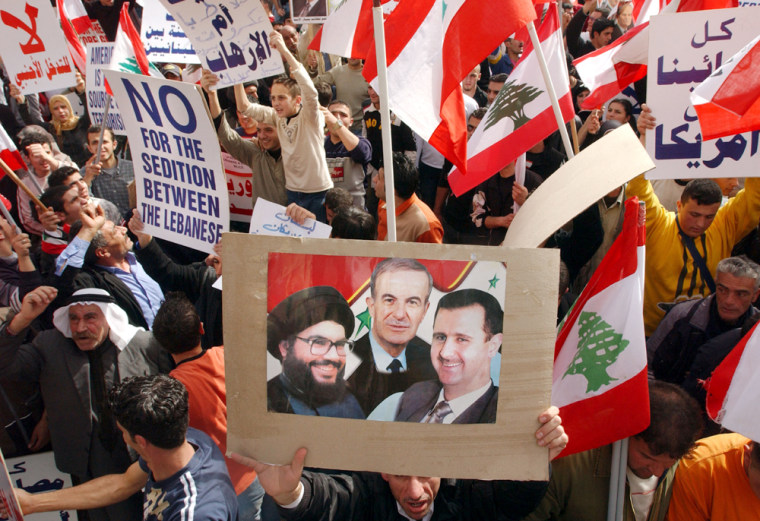Nearly half a million people turned out in Beirut on Tuesday for pro-Syrian demonstrations.
NBC News' Jim Maceda reports from the Lebanese capital on how the peaceful "coming out party" for Hezbollah was an important exercise in the fledgling democracy that is Lebanon.
Can you describe the scene in Beirut today?
Well it certainly was impressive. There was a sea of humanity as far as the eye could see. The crowd was truly large and absolutely dwarfed anything we’d seen from the pro-democracy, "Independence Intifada" camp over the last eight or nine days.
There are so many different ways to describe it. On one level it was it was a "coming out party" for Hezbollah.
It was probably the first time Hezbollah organized such a political gathering, put down its weapons, downplayed its military aspect, picked up a Lebanese flag and just melted into the crowd.
The demonstration was organized by Hezbollah, but it was much bigger than Hezbollah’s agenda. It combined many disparate groups, mostly Shiites, but also a lot of Lebanese government officials, as well as Amal, another pro-Syrian Shiite group.
But there was one overriding message: that [the pro-Syrians] are another face of democracy. It was, "We want peaceful change as well, but we want to do it our way. We don’t want international intervention, we don’t want our friends like Syria pushed into a corner and we want to show you that."
How large was the crowd?
There were probably hundreds of thousands out there, which we have not seen before on the streets of Beirut. The organizers are saying one and a half million. I probably saw, as far as my eye could see, 150,000 to 200,000. But, I did not see the aerial photos, which went beyond that.
Who were the demonstrators?
These people who were demonstrating today were not coming only from south Beirut. They were bused in the north, south; they were members of Hezbollah, as well as Amal, another popular Shiite group.
There were also a lot of pro-Syrian lackeys, if you will, the pro-Syrians put into place to run this country’s economy, either from business or from government, or from the underworld or from the intelligence and secret service agencies. All these people were out en masse today.
I think it was the largest platform that Sheik Nasrallah, who was the key speaker, has ever had.
Nasrallah was his usual eloquent and forceful self, saying all of the things he has often said —down with American intervention, down with U.N. Resolution 1559 [which calls for Syria to withdraw its troops], that they were not going to be told what to do with the country.
But the difference was that he was now speaking to hundreds of thousands of people and to the world. He had an extraordinary forum, which Nasrallah has not had before.
This was a huge, huge step toward the rehabilitation and redefinition of Hezbollah. They are trying to redefine themselves and know that they cannot be what they used to be before —what some would say was a very radical terrorist group.
Now, for the first time, they are coming out to show the world, and the Lebanese, that they are a true political player. And a big player at home.
They took sides for the first time ever in an internal Lebanese debate. They made it very clear that they are for Syria, and if Syrian troops have to be pulled out, it has to be a well-thought-out negotiation with the Lebanese, not something imposed by the United Nations or George Bush.
Was the crowd peaceful? Was there a fear of clashes with the anti-Syrian demonstrators a few blocks away?
The crowd was very peaceful. We were right in the thick of the crowd and it felt very peaceful.
We were talking to people as an NBC News crew, so they knew we were Americans, and they came to us and we had very good discussions. It was very open, very frank and very friendly. I felt no tension at all in the course of the day.
There was plenty of security out there. Several units of the Lebanese army, probably hundreds of troops. And they were not riot police. These were troops that had real weapons and real bullets, not rubber bullets. But they looked very relaxed as well as they formed a ring around the demonstration. There were no incidents at all.
The pro-democracy or independence uprising group did not have any kind of counter demonstration today. They really did lay low. There was almost no activity at all at the neighboring Martyr’s Square, about 300 yards away.
How was today’s demonstration an example of democracy?
For me, it was very encouraging to see — particularly as someone who covered Lebanon in the '80s and even the '70s, and saw the civil war and the subsequent catastrophe of the Israeli invasion here.
Earlier we saw masses of people — Christian, Druse and some Sunnis — coming out for one idea, to move democracy forward.
And then today, we saw a very different look from people who you might call conservative, coming out in huge numbers to express their preferences in a peaceful way.
You have a debate here, as you do in many societies between people who want to move forward and people who are more comfortable staying where they are. That’s really what you have and that’s what the divide is.
But there was no sense at all that it was anything other than a positive exchange of ideas in the streets through demonstrations, rather than returning to the old habits of forming militias and having militias shoot it out at each other on street corners.
From that perspective, it passed the first test of this fledgling democracy.
It could all change with one terrorist attack, but today there was a peaceful exchange of ideas.
